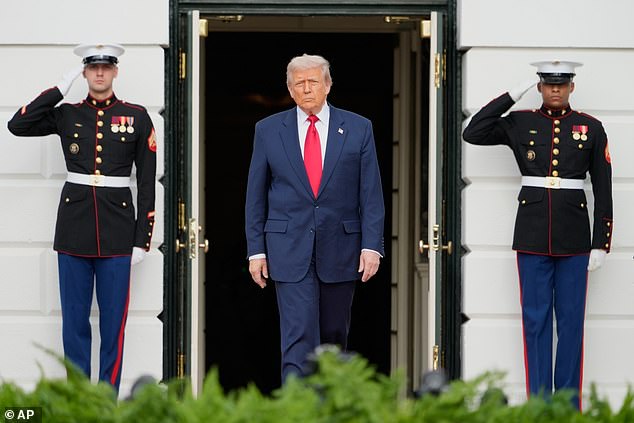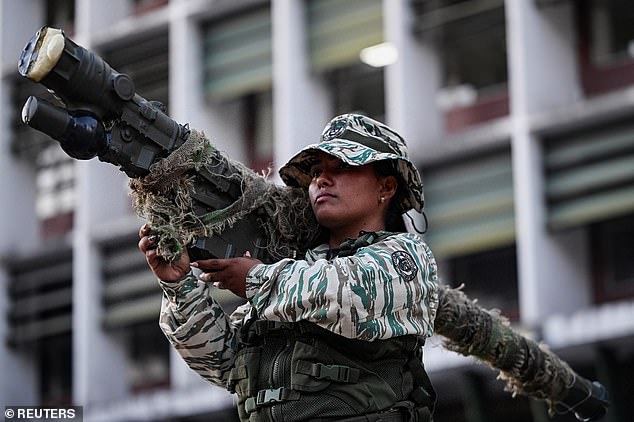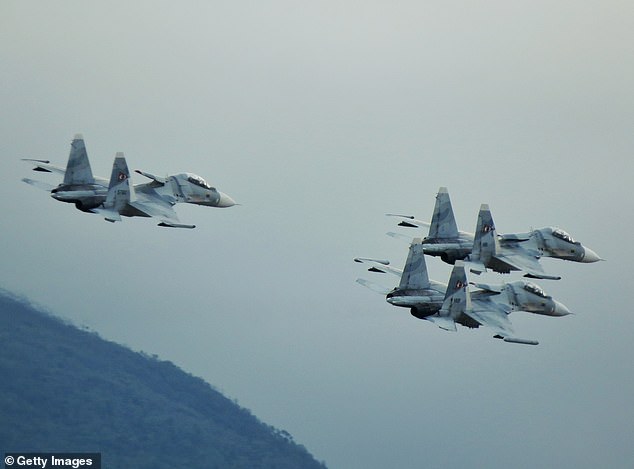The United States has issued a terrifying new air travel warning as the Venezuela crisis spirals.
The Federal Aviation Authority sent out a Notice to Air Missions (NOTAM) at 1.0pm alerting pilots, airlines, and air traffic controllers of a ‘potentially hazardous situation’ in and around Venezuela.
The alert speaks of a ‘worsening security situation and heightened military activity in or around Venezuela.’
‘Threats could pose a potential risk to aircraft at all altitudes, including during overflight, the arrival and departure phases of flight, and/or airports and aircraft on the ground,’ the FAA notice states.
The warning is for the Maiquetía Flight Information Region which includes Venezuelan airspace and parts of the southern Caribbean – such as Colombia, Guyana, Brazil, and Trinidad.
Trump on Monday refused to rule out strikes on Venezuela amid the largest build-up of American troops in the Caribbean since the Cold War.
The president is waging a war against ‘narco-terrorists’ which the administration accuses of funneling drugs into the US on the orders of socialist tyrant Nicolas Maduro.
Trump reiterated that he ‘probably would talk to’ Maduro, but underscored that he is not taking off the table the possibility of military action on Venezuelan territory. Hours later, Maduro said he is open to dialogue with the Trump administration.

President Donald Trump waits to welcome Saudi Arabia’s Crown Prince Mohammed bin Salman to the White House, Tuesday

A member of the Bolivarian Militia holds a weapon during a rally amid rising tensions with the United States, in Caracas, Venezuela, October 30

File photo of Venezuelan Sukhois Su 30MK2 flying over Caracas
‘I don’t rule out that. I don’t rule out anything,’ Trump told reporters in the Oval Office on Monday.
Trump, however, sidestepped questions about whether Maduro could say anything to him that would lead to the US backing off its military show of force.
‘He’s done tremendous damage to our country,’ said Trump, tying Maduro to the inflow of drugs and illegals. ‘He has not been good to the United States, so we’ll see what happens.’
The comments from both leaders deepened the uncertainty about the Trump administration’s next steps toward Maduro’s government.
America has ratcheted up the pressure in recent days, saying it was expecting to designate as a terrorist organization a cartel it says is led by Maduro and other high-level Venezuelan government officials.
The USS Gerald R. Ford and accompanying warships arrived in the Caribbean this weekend just as the US military announced its latest in a series of strikes against vessels suspected of transporting drugs.
The administration says its actions are a counterdrug operation meant to stop narcotics from flowing to American cities, but some analysts, Venezuelans and the country’s political opposition see them as an escalating pressure tactic against Maduro.
The Trump administration has shown it ‘can turn policy on a dime,’ said Geoff Ramsey, an expert on US policy toward Venezuela who is a nonresident senior fellow at the Atlantic Council.
He pointed to the diplomatic talks the administration held with Iran ‘right up until the point’ that the U.S. military targeted Iran´s nuclear facilities in June.
But, Ramsey added, the timing of Trump’s remarks – after Secretary of State Marco Rubio´s announcement of the impending terrorist designation of the Cartel de los Soles – underscores that the administration does not want to repeat failed attempts at dialogue.
‘They really want to negotiate from a place of strength, and I think the White House is laying out an ultimatum for Maduro,’ Ramsey said. ‘Either he engages in credible talks about a transition, or the US will have no choice but to escalate.’
Maduro has negotiated with the US and Venezuela’s political opposition for several years, most notably in the two years before the July 2024 presidential election.
Those negotiations resulted in agreements meant to pave the way for a free and democratic election, but Maduro repeatedly tested their limits, ultimately claiming victory despite credible evidence that he lost the contest by a 2-to-1 margin.
Among the concessions the U.S. made to Maduro during negotiations was approval for oil giant Chevron Corp. to resume pumping and exporting Venezuelan oil. The corporation´s activities in the South American country resulted in a financial lifeline for Maduro´s government.
During his weekly television show Monday, Maduro addressed Trump’s comments, saying that ‘free countries and governments should only understand each other through diplomacy.’
‘Anyone who wants to engage in dialogue will find in us people of their word, decent people, and people with the experience to lead Venezuela,’ he said. Later, in English, he added: ‘Talk, yes. Peace, yes. War, no. Never, never, war.’
A spokesperson for Venezuelan opposition leader and Nobel Peace Prize winner María Corina Machado told reporters Monday that she would not comment on Trump’s remarks.
The president didn’t even rule out possible military action against close allies in the region.
‘Would I want strikes in Mexico to stop drugs? OK with me, whatever we have to do to stop drugs,’ Trump said, adding that he´s ‘not happy with Mexico.’
Trump said the US government has drug corridors from Mexico ‘under major surveillance’ and said he would also like to target Colombia´s ‘cocaine factories.’
‘Would I knock out those factories? I would be proud to do it personally. I didn’t say I’m doing it – but I would be proud to do it,’ he said.
Trump’s goal on Venezuela remains unclear, but above all, Ramsey said, the president ‘is looking for a win.’
‘And he may be flexible on exactly what that looks like,’ Ramsey said. ‘I could envision the US pushing for greater control over Venezuela´s natural resources, including oil, as well as greater cooperation with the president´s migration and security goals.’
In Venezuela’s capital, Caracas, people responded with skepticism and hope to the possibility of a new dialogue between the US and Maduro, whose government has fueled rumors of a ground invasion despite the Trump administration giving little clear indication of such a plan.
‘If (the dialogue) actually happens, I hope the government will actually follow through this time,’ shopkeeper Gustavo García, 38, said as he left church. ‘We have to be serious. They’ve gotten us used to them talking, but they don´t honor the agreements. You don´t mess with Trump.’
Stay-at-home mother Mery Martínez, 41, said, ‘Talking is always better.’
‘Anything that helps prevent a tragedy is good,’ Martínez said. ‘Venezuelans don´t deserve this. A war benefits no one.’

